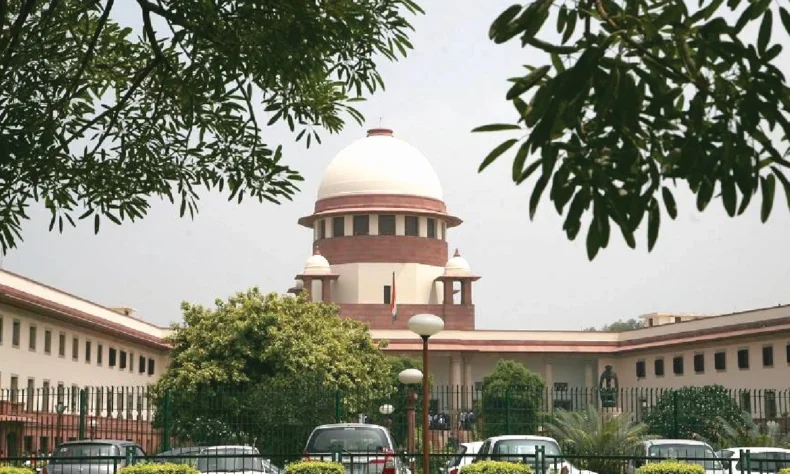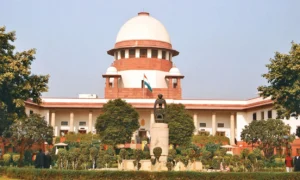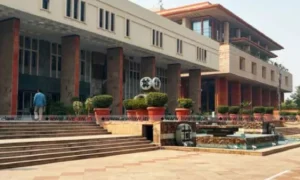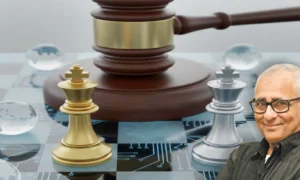
By Dilip Bobb
The Supreme Court has described as “alarming” the pendency of more than 8.82 lakh execution petitions before various courts across the country. Execution petitions are not to do with death sentences, but pleas seeking enforcement of court orders passed in civil disputes.
A bench of Justices JB Pardiwala and Pankaj Mithal made the “alarming” observation while reviewing compliance with its March 6 order, which had directed all High Courts to instruct civil courts under their jurisdiction to decide execution petitions within six months. The bench had also clarified that presiding officers would be held accountable for any delay in following its directive.
“The statistics which we have received are highly disappointing. The figures of the pendency of the execution petitions across the country are alarming. As on date, 8,82,578 execution petitions are pending across the country,” the bench said.
The top court’s direction came after it was informed that over eight lakh execution petitions are pending in district courts of the country, with Maharashtra accounting for nearly 39 percent of the total pendency. This means that close to 3,41,000 execution petitions await final disposal in the state’s district judiciary. Tamil Nadu, Kerala, Andhra Pradesh and Madhya Pradesh are not far behind. Tamil Nadu has 86,148 cases still awaiting a decision, and there are 82,997 similar cases in Kerala. In Andhra Pradesh, 68,137 execution petitions are pending, with 52,219 cases in Madhya Pradesh.
Most people are unfamiliar with the judicial procedure called an execution petition. At the conclusion of a civil lawsuit, the court delivers an order, or decree, that states the rights and liabilities of the parties involved. However, to get a decree executed, an execution petition is required. It is the most crucial stage of a civil lawsuit in which the party that the court’s decree has favoured formally requests the court to enforce its decision against the losing party, usually involving a compensation payment or vacation of a property. That essentially amounts to a second round of
litigation for a lawsuit which the petitioner has already won.
“After the decree is passed, if it is going to take years and years to execute the decree, it would be nothing short of a travesty of justice,” the bench noted in its October 2025 order. “We direct all the High Courts across the country to call for the necessary information from their respective district judiciary as regards pendency of the execution petitions,” the bench observed.
The top court directed that after collecting the data, the High Courts should issue an administrative order or circular to the respective district judiciary asking that execution petitions be decided and disposed of within six months without fail. “Otherwise, the presiding officer concerned would be answerable to the High Court on its administrative side,” it added.
The verdict said once the relevant data was collected by the High Courts, it should be forwarded to the registry of the top court with individual reports. The registry was directed to convey the order to all High Courts, and the matter was posted after seven months for compliance.
The top court noted that in 2021 and subsequently in 2022 it had directed that the execution proceedings be completed within six months from the date of filing, but the directions were yet to be followed. The bench highlighted a “long and inordinate” delay on the part of executing courts in the country in deciding such petitions.
The civil dispute before the bench concerned a sale agreement of June 30, 1980, entered into by Tamil Nadu resident Ayyavoo Udayar over a piece of land. After a dispute arose over the title, Udayar filed a civil suit against the defendants in 1986. In 2004, the decree-holder filed a petition to direct the defendants to execute the sale deed and deliver possession of the property. It was, however, dismissed. This was challenged by a revision petition, which was allowed in 2006, but the sale deed was again not executed. In 2008, an order of delivery of possession was passed, but not executed.
The top court held that the High Court “committed an egregious error” in passing the order. “We are of the view that the rejection by the High Court of the amendments to the execution petition filed by the appellants was erroneous and deserves to be set aside. The executing court should now proceed to ensure that vacant and peaceful possession of the suit property is handed over to the appellants in their capacity as decree holders, and if necessary, with the aid of police, within two months without fail.”
The apex court once again urged all High Courts to evolve a procedure and guide their respective district judiciary for time-bound disposal of pending execution petitions.
The Supreme Court singled out the Karnataka High Court, saying, “it had failed to furnish us with the necessary data in this regard. The Registrar General of the Karnataka High Court owes an explanation why he has failed to provide us with the necessary information. Two weeks’ time is granted to the Registrar General of the High Court to offer his explanation in this regard,” the order said.
The bench said it expected complete figures from all High Courts on both the pendency and disposal of execution petitions. “When this matter is notified once again on April 10, 2026, we want all the High Courts on their original side also to furnish the necessary information as regards the pending execution petitions as well as disposal of the same,” it said.
Earlier, on March 6, the Court had noted that execution petitions filed for enforcing decrees in civil disputes had remained pending for three to four years. “If the execution petitions remain pending for three-four years, it defeats the very purpose of the decree,” Justice Pardiwala had observed.
The Civil Procedure Code (CPC) mandates several steps, including issuing notices, hearing objections, and providing multiple opportunities to the losing party, which can inevitably stretch over years. According to the National Judicial Data Grid, an average civil suit takes 4.91 years to conclude. An execution petition takes another 3.97 years. Incredibly, nearly 47.2 percent of pending execution cases were filed before 2020.
The pendency of execution petitions not only adds to the overall backlog, which is “alarming” enough, but the more serious fallout is that it undermines public faith in the judiciary. For litigants, it means continued financial and emotional strain. No closure despite winning a case promotes the perception that justice is inaccessible or ineffective. Or, to quote an old legal axiom: “Justice delayed is justice denied”.
According to available data, the top reasons for delay in execution petitions are:
- Counsel not available: 38.9 percent.
- Stay by another court: 17 percent.
- Awaiting documents: 12 percent.
There is, of course, another reason— execution petitions are often treated as low-priority matters in most High Courts. They are frequently considered administrative rather than judicial matters. Another connected factor is that the execution process involves multiple steps: notice issuance, objections, attachment of property, and sometimes police assistance. Many petitioners or defendants use legal tactics to delay compliance, including filing frivolous objections or appeals, or the legal representative not showing up on one excuse or another. Moreover, until recently, there was minimal oversight on how long execution petitions remained pending.
In 2021, a three-judge Supreme Court bench led by then Chief Justice SA Bobde had issued 14 mandatory directions to trial courts, including a six-month deadline for disposing of execution matters. Not much has changed in terms of disposal. Now, the Supreme Court has granted six more months to all High Courts to expedite disposal, apart from directing the Registrar General of the Karnataka High Court to explain non-compliance with earlier orders.
The Law Commission of India, in its 14th Report, had recommended reforms to streamline execution proceedings. That led to amendments in the CPC in 1976, allowing executing courts to adjudicate all related questions within the same proceedings, eliminating the need for separate suits.
There have also been suggestions for dedicated execution benches in civil courts, digitization and tracking of execution cases, and strict timelines and performance audits for judicial officers.
The backlog of execution petitions exposes a profound structural flaw in India’s judicial machinery. The Supreme Court’s strong words, describing it as a “travesty of justice”, serve as an urgent call for coordinated and systemic reform. However, if the past and the “alarming” numbers are any indication, the main cause for the delay in execution petitions remains, well, execution!
—The writer is former Senior Managing Editor, India Legal magazine
📰 Crime Today News is proudly sponsored by DRYFRUIT & CO – A Brand by eFabby Global LLC
Design & Developed by Yes Mom Hosting






